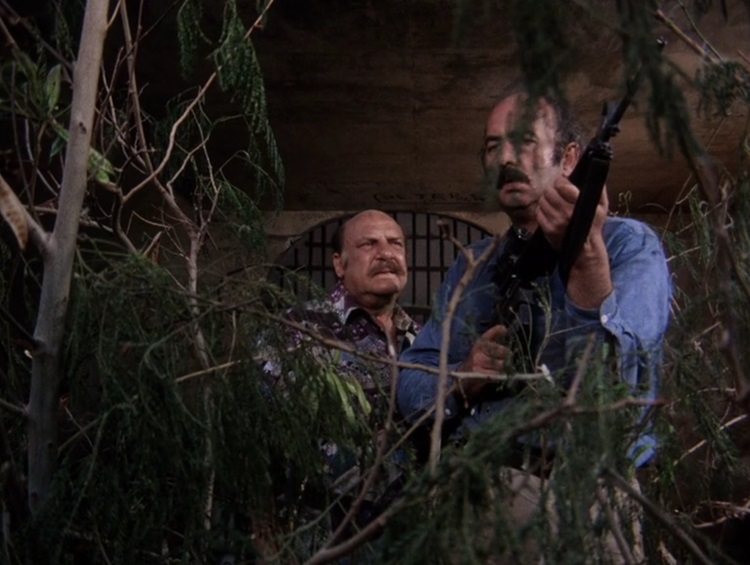 Minor trigger warning for mentions of sexual assault.
Minor trigger warning for mentions of sexual assault.
Something I frequently encounter while watching my cop shows are the grey moral areas that our heroes wander into. Specifically -at least for this post- I’m thinking of the victims and culprits and the audience’s perception of them.
For example, in the Hawaii Five-O episode “Little Girl Blue”, the two men who kidnap the little girl of the title aren’t your typical hardened criminals. Luther -played by Ron Feinberg- is a 6ft 7in beast of a man who has the mental equivalency of a child thanks to a brain injury incurred during his service in Vietnam. Meanwhile, Frank -played by Jackie Coogan- is a former orderly with a bad heart and considered the brains of the operation only because he’s at least functioning at an adult level. It’s not quite a Lenny and George scenario from Of Mice and Men, but it has that flavor.
We know from the initial kidnapping that these aren’t your ordinary criminals. The two men take the time to wrap the little girl up in a blanket and put her slippers on her. In fact, if their getaway hadn’t been interrupted, little Debbie would have been treated to a picnic while waiting for the ransom to be paid and everything to work out. None of the violence we saw would have happened if that cop hadn’t pulled Luther and Frank over. And really, the only reason Luther panicked in the first place was because the cop asked him for his license and he didn’t have one. It’s just an unfortunate series of events that land these two guys in hotter water than they’d intended to boil.
You just kinda feel bad for these guys. Obviously, Luther’s diminished capacity and Frank’s bad heart and bad choices don’t absolve them of their behavior, but you’re not exactly rooting for Five-O to come down hard on them.
Or maybe the audience was back when this episode aired in 1973. Maybe the deaths of two cops was enough to erase any shred of sympathy the viewer might feel for Luther and Frank. Or maybe when the kidnapping went sideways and Debbie was crying for her mom, maybe that was enough to alienate the viewers and have them rooting for Luther and Frank to get what was coming to them.
Or maybe they felt just as torn about it then as we do now. Or at least I do.
Then there’s the flip side. When the victim isn’t that great and you’re kind of not sorry they’re dead.
In the CSI: Miami episode “Forced Entry” a burglar/rapist gets what he gives in the exact fashion that he gave it. Only, he didn’t kill his victims. Instead, one of them kills herself and it looks very much like the grieving husband might have exacted revenge. Who else would know how the victims were bound, gagged, and assaulted so that they could recreate it with such detail?
The husband in question points out how cruel it is that the police are more concerned with finding the killer of his wife’s rapist than they are with his wife’s assault, which led to her suicide. And it is a cruel. Even Speed says that killing this piece of shit should earn the husband a medal if he did it. I’m on Speed’s side here. My guy played around and lost big. Oh well.
But that’s not how these sorts of episodes work. We might be on the side of the killer, but as it’s pointed out, it’s not the killer’s job to dispense justice. I don’t know about that. I think they didn’t a pretty good job here.
Okay, yes, there’s the whole concept that nobody deserves to die, and maybe that’s true, but that doesn’t mean we have to feel bad when some vile garbage gets their comeuppance. We’re not in the wrong to save our sympathy for the killer when justice is served because it feels like it’s being served to the wrong person.
These sort of muddy moral waters are interesting because of how they age. Some are timeless. Some switches the sympathies, swinging them around from the original, intended person to someone else. Just look at hippies. They were the villains in many cop shows back in the day, particularly Dragnet. Nowadays, though, you’d probably find more people on their side than on Joe Friday’s. Especially when it comes to marijuana.
I love exploring these moral grey episodes. They make me angry and they make me uncomfortable and they make me think and it’s fascinating to see how that shade of grey can turn black or white over time.
In the end, I find it quite colorful.